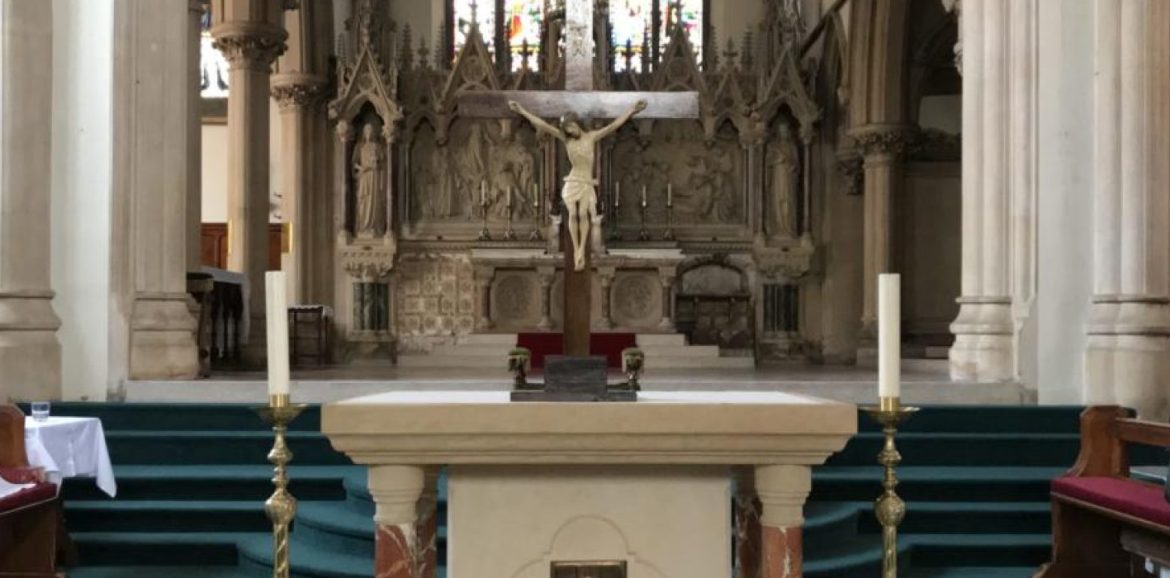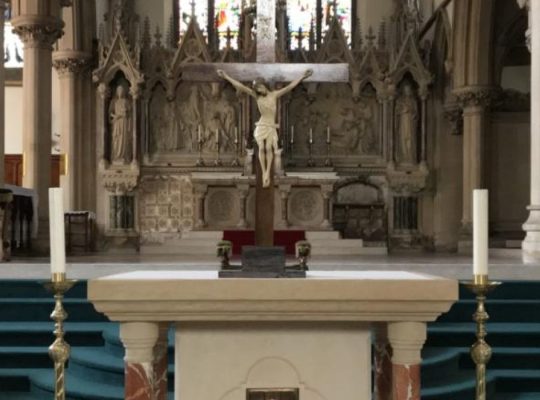Welcome to the Fifth Sunday of Easter, I don’t know about you, but it never ceases to amaze me how the fifty days of Easter seem to go a lot faster than the forty days of Lent, already we are halfway through Eastertide and heading for that great Feast of Pentecost, and the coming of the Holy Spirit.
The diversity of charisms, personal vocations, and life situations in the Church produces an array of spiritualities that are so many ways of seeking God in the light of the Gospel. Some of these paths cross each other, run parallel, or even join up for a certain distance. This does not mean they cannot be distinguished, but even so, all of them are roads to faith, following Christ, with the goal of living in communion with God. Thus says our Second Reading today, from the First Letter of Saint John.
There is one sure means of verifying that one is on the right path, unconditional and boundless fraternal charity. John, more than anyone else insists on this point. “[Jesus] laid down his life for us, so we ought to lay down our life for our brothers.” This demand might seem to appear unrealistic or limited to those who are actually willing to die for others. Nothing of the sort. “Children, let us love not in word or speech but in deed and truth.” This is God’s commandment, the one from which all others flow, of which all others are interpretations. It has an unlimited field of application; at any moment, in any situation, it determines what must or must not be done; it admits no exceptions or excuses; it is the standard by which everything is judged, especially the reality of communion with God.
To agonize over the rumblings of one’s conscience serves no purpose other than to torment one with sterile remorse. True regret for transgressions does not focus on oneself but turns toward God who, as he pardons us, gives us the true humility we need to move on. “Lord, you know everything; you know that I love you” (John 21:17). Yes, he knows everything. He is much more merciful to us, than we are toward ourselves. Who are we to hang on to things that have been forgiven by God? Let God’s forgiveness be fruitful in us, then, we will realise that God loves us more than we love ourselves. He knows that with his grace we are capable of infinitely more than we had dared to dream. But, on the other hand, don’t try to hide your sins from God, saying to yourself: “My conscience tells me this or that and is clear, I need no forgiveness.” Saint Augustine has this to say:
“If our conscience charges us, that is to say, if it accuses us inwardly, because we have not acted with the intention we should have had, God is greater than our hearts and all is known to him. You hide the depths of your heart from men; hide it from God, if you can! How could you hide from him, the one to whom a sinner with a fearful or repentant heart once said: ‘Where can I go from your Spirit? From your presence where can I flee?’ He wanted to know where he could go to escape God’s judgement, and he couldn’t find out. Where is God not present? If I go up to the heavens, you are there; if I sink to the nether world, you are present there.’ Where to go? Where to flee? Flee toward him while confessing, not while trying to hide; you cannot hide from him, but you can confess your faults to him. Say to him: ‘You are my refuge’; and nourish in yourself the love that leads alone to life.”
So throw yourselves into the merciful arms of God, confess your faults, receive his mercy, his grace, his forgiveness, and then move forward never looking back.
Fidelity to the commandments is the concrete criterion which verifies that one belongs to the truth and may have a peaceful heart before God, since one dwells in him. There is more: God himself dwells in us by the Spirit whom he has given us. We live in God because God lives in us! The good that we do does not come from ourselves but from the Spirit who is present and active in us. It verifies that we are truly children of God. Thus, since we do not know how to pray as we ought, “the Spirit too comes to the aid of our weakness,” and “intercedes with inexpressible groaning” This is why “whatever you ask in my name, I will do,” as Jesus promised us. Also, we are able to love as God who is Love because his love has been poured out into our hearts.
“If, then, you want to know whether you have received the Sprit, question your heart: ask yourself if you would not have the sacrament without the virtues of the sacraments. Ask your heart, if you would find love for your brother there, be at peace. Love would not be found there if the Holy Spirit were not present, for Paul tells us: ‘The love of God has been poured out in our hearts through the Holy Spirit who has been given to us.’”
In our Gospel today we hear Jesus say “remain in me.” This is one of the key phrases of John’s vocabulary. In its strongest sense, it expresses the bond that unite the Father and the Son, the Son and the Spirit. The same verb refers to the relation instituted between God and the one who keeps the faith and the commandments, between Jesus and his disciples. One of the passages that expresses it most strongly and suggestively is the one we read today.
“I am the true vine and my Father is the vinedresser.” This form of speech is used in the great revelations: “I am the Bread of Life”, “the living bread”; “I am the gate”; “ I am the good shepherd”; “ I am the way the truth and the life. All reminiscent of the name, of God, given to Moses on Mount Sinai “And if they ask who sent me, whom’ shall I say? ’Tell them I AM sent you’.”
The Old Testament speaks readily of the chosen people as the vine planted by God. The object of his love and care, it should produce the fruits of justice and holiness. Unfortunately, it has often disappointed God. He has had to intervene to save the healthy shoots from corruption and use them to rebuild his domain. For he so loves his vine that the prospect of having to destroy it fills him with deep sadness.
Matthew’s Gospel contains three parables in which Jesus uses the traditional image of the vine to denote the kingdom of God. At the hour of the final revelation, given to his disciples when he was about to pass from this world to his Father, he identified himself —
“I AM”— as the “true vine.” This is a suggestive image. Normally one speaks of a good vine stock or quality shoots. Jesus, rather, is the “true” vine, who absolutely cannot deceive. He possesses a unique quality, transcendent, like no one before or since; it is impossible to conceive of a substitute for him. If therefore there are found some dry branches that bear no fruit, they must be cut off. They are good for nothing if not for the fire. Clearly, Jesus knew what vineyard workers do. “Look what they do,” he says to us. “My Father, the vinedresser, does the same in the vineyard he has planted, which he cultivates with care.”
The vineyard owner prunes the good branches so that they will produce more fruit. Dead wood is cut down, gathered, and laid aside to be burned. Likewise, those branches that for one reason or another are more or less separated from the stock, there is no chance that they will survive and be laden with grapes. On the other hand, those branches firmly attached to the stock will bear blossoms and fruit in season. A sick vine in any season presents a spectacle of desolation and death, whereas branches of a healthy, well-pruned vine offer hope of a good harvest.
“Remain in me as I remain in you.” The image gives way to the reality. It is the word of the Lord that trims the vine. It is the welcome reception of Jesus’ words that testify to and guarantees the disciples fidelity. The fidelity must be constant, for it is a perpetual source of judgement.
The vineyard owner is proud of his vines that bear much fruit. Likewise, the fruitfulness of the Christian life united to Christ gives glory and witness to God; it preaches by action. Jesus was not content with teaching in words. He performed many “signs” that revealed him to all as God’s messenger, validated his teaching, and gave glory to his Father. Individual Christians and the Church must bear themselves this same way so that the world may believe and God may be glorified. Without works, faith is dead; the mere profession of it is worthless. Instead of leading to God, it points away from him. A good tree is known by its fruits. The Father cannot allow withered branches to cast doubt on the quality of the vine, i.e. the holiness of his Son and the Gospel. He “trims” us constantly so that we may bear more fruit while renewing our faithfulness day after day. He strengthens us at the tables of the Word and the Bread {Body], sharing the cup of the fruit of the vine [Blood}, “Wine of eternal salvation.”
“When the hour had come for him to pass from this world to the Father,” Jesus spoke at length with his disciples, gathered with him to celebrate the Last Supper that he had “eagerly desired” to eat with them. This farewell discourse looks to the future, not the past. Jesus does not tell them what he has been or has done for them; he reveals what he is and what he will evermore do for them; he unveils the secret of life that his resurrection opens for them. First, they must know that by their faith they are intimately bound to him like branches to the vine stock and that they will thus bear the fruits of eternal life for the glory of the Father. When believers thus remain in Christ, when his life runs thus in the members of the Church, their share in the truth is made clear. They are “signs” of God and his Christ in the world. Their hearts swell, they welcome joyfully and unhesitatingly all those who are in their turn grafted onto the Father’s vine, no matter from where they come, even if they were recently persecutors of the Church, like Saul.
‘Whoever remains in me, with me in him, bears fruit in plenty.


